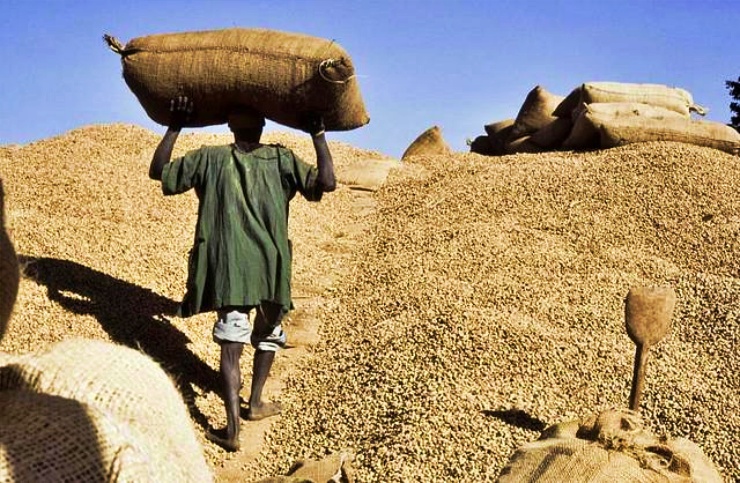Gambiaj.com – (DAKAR, Senegal) – The 2024-2025 peanut marketing campaign, officially launched on December 5 across Senegal, has failed to meet the expectations of producers and key stakeholders, particularly in the Kaolack region—long regarded as the country’s peanut basin, according to a field investigation report by the Senegalese official government’s news agency, Agence de Presse Sénégalaise, (APS).
Sidy Bâ, Secretary General of the Peanut Producers’ Consultation Framework (CCPA), recalled that last year, the Directorate of Analysis, Forecasting, and Agricultural Statistics (DAPSA) estimated peanut production at 1.5 million tonnes. This year, however, production is projected to be between 700,000 and 800,000 tonnes—a drastic decline that threatens farmers’ incomes.
Poor-quality Seeds and Fertilizers With Deficient Rainfall Affect Yields
While some farmers blame poor-quality seeds and fertilizers for the disappointing harvest, Bâ argues otherwise, particularly regarding fertilizers. Instead, he attributes the decline to a critical lack of rainfall at key stages of production, particularly between August 25 and September 12.
“In August, Gandiaye recorded no less than 200 mm of rainfall, while in September, the rainfall exceeded 300 mm,” he noted. “These heavy rains caused more damage than benefits to production.”
The marketing campaign has also been marked by a shortage of buyers, with Sonacos (National Society for the Marketing of Oleaginous Products) being the sole major actor in the market. Farmers have been forced to sell their peanuts below the official price set by the National Interprofessional Award Committee (CNIA) and approved by the state.
“Today, peanut seeds are being sold on the black market at 225 CFA francs per kilogram, well below the official price of 305 CFA francs set by the government. This has even led to arrests in different parts of the country,” Bâ stated.
The lack of financial liquidity among private stockists and the absence of exporters have further disrupted the market, leading to a significant drop in farmers’ revenues.
Government’s Export Ban Exacerbates Market Challenges
One of the most contentious issues affecting this year’s campaign is the government’s decision to block peanut seed exports, a move that many in the sector view as detrimental.
“If we had more buyers and the presence of previous stakeholders, we wouldn’t be facing this crisis,” Bâ lamented. “The government, through the Ministry of Agriculture, must learn from this experience and take corrective measures.”
He further pointed to the impact of climate change, emphasizing that erratic rainfall patterns are worsening production challenges. “The rains now fall more in September than in August, causing significant damage to crops,” he added.
Calls for Reforms in Peanut Sector Governance
The crisis has reignited calls for the dissolution of the CNIA, with Bassirou Bâ, President of the Aar Sunu Moomeel Association, advocating for a new structure that better represents farmers’ interests.
“The parameters used to determine peanut prices are not properly assessed,” he argued. “Labor costs and family workforce valuation are not adequately factored in when setting prices.”
His organization is calling for the removal of peanut seed subsidies, increased fertilizer support, the reopening of borders to improve peanut marketing, and the elimination of the government-mandated floor price.
However, Sidy Bâ, who also serves as a spokesperson for the National Council for Consultation and Cooperation of Rural Actors (CNCR), opposes dismantling the CNIA. Instead, he insists that leadership should be placed in the hands of actual peanut producers rather than seed storage operators.
Farmers Push Back Against Government-Controlled Cooperatives
The government’s proposal to establish community agricultural cooperatives has also sparked debate. Farmers’ representatives insist that such initiatives should be left to those directly involved in the sector.
“The government should rely on existing structures rather than imposing new ones,” said Ibrahima Thiam, an agricultural union leader from Médina Niassène, in Keur Madiabel.
Thiam recalled that during the November 2024 legislative election campaign, Prime Minister Ousmane Sonko had promised to restore sovereignty to local farmers. “We are apolitical citizens working for our country’s economic and social development. We need our leaders to listen to us,” he said.
He warned that state-run cooperatives could undermine existing farmer-led initiatives. “Many state-led agricultural projects have failed, including the Union Japandoo initiative launched by former President Abdoulaye Wade,” he noted.
Uncertainty Remains Amid Lack of Government Response
Despite repeated attempts, APS was unable to obtain comments from key government officials, including the regional head of the Directorate of Rural Development in Kaolack, Samba Gaye, and Habib Thiam, President of the Peanut Producers and Exporters Collective (COPEGA). Similarly, efforts to speak with representatives of Sonacos in Lyndiane proved unsuccessful.
As uncertainty looms over Senegal’s peanut sector, producers are left grappling with a difficult season, calling for urgent government action to stabilize the market and ensure fair pricing.










